Meeting the men behind Portsmouth's navy bomb disposal team
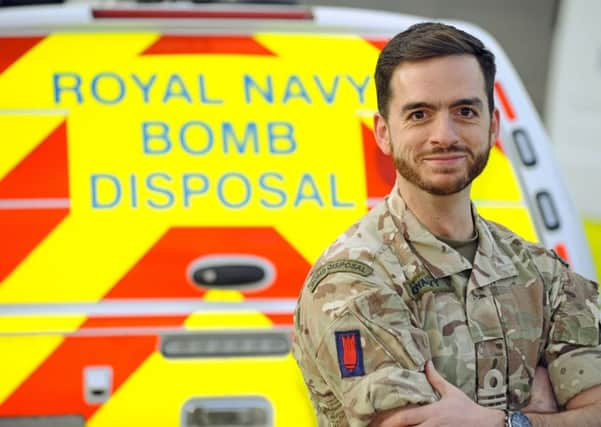

The unnamed operator is probing the underside of a vehicle for a suspected car bomb, just one of the many explosive threats the Royal Navy’s elite team has to be prepared to tackle.
Manoeuvring his head awkwardly in his large protective helmet, the diver positions a tube under the vehicle which will be used to blast the car bomb to smithereens.
Advertisement
Hide AdAdvertisement
Hide AdAlthough only a training mission this time, Lieutenant Commander Jonny Campbell admits the reality of taking on tasks like this is ever-present, and that constant practise is crucial.
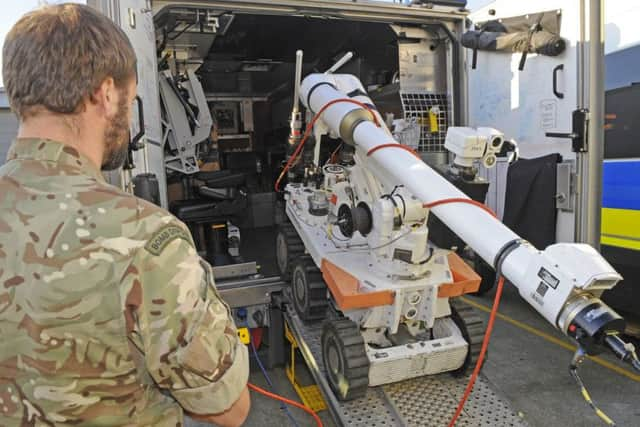

‘The UK mainland has learnt a lot from conflicts in Northern Ireland and conflicts overseas,’ says the navy diver, who is officer in charge of Southern Diving Unit 2 at Horsea Island.
‘There has been a fair level of terrorism involved with these sort of devices in the past.
‘What we’ve always done is taught good habits and we’re taught a good deterrent so we can respond safely to any sort of incident like this and keep the public safe.
Advertisement
Hide AdAdvertisement
Hide Ad‘But you almost can’t train enough – we want our operators to be safe and to keep the public safe. We have to make sure we’re on top of our techniques.’
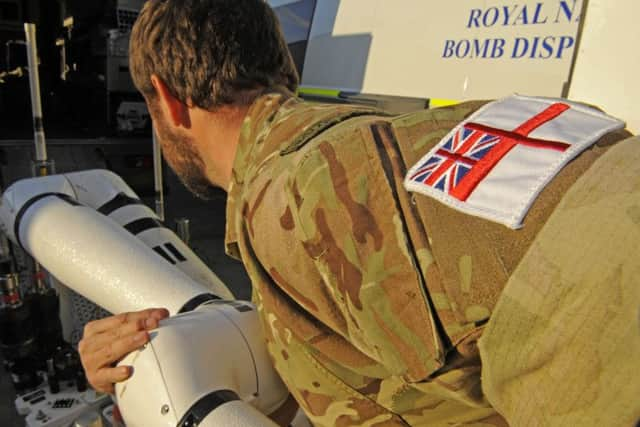

The squad is made up of about 25 highly-trained divers, who are experts in underwater bomb disposal operations.
They are always on constant alert, with teams working on a rota, ready to dispatch within minutes of being alerted.
As figures revealed by The News today show, the team is called out, on average, almost three times a week.
Advertisement
Hide AdAdvertisement
Hide AdA majority of these missions involve operators having to get hands-on with lethal explosives that have the power to seriously injure and even kill.
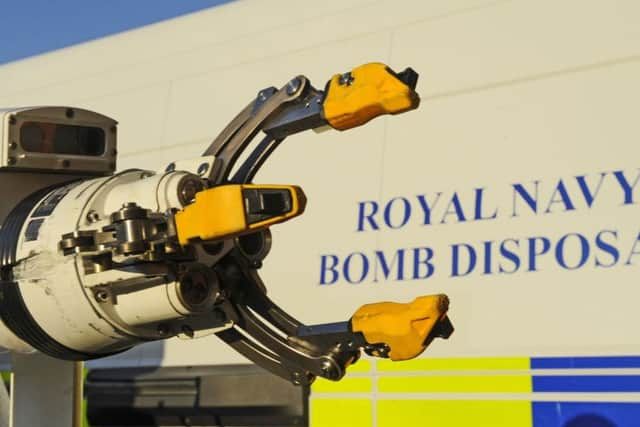

Yet despite the pressures the small band of elite bomb disposal experts face, none of them show any sign of stress.
‘Our training prepares us for absolutely anything. We’re ready for whatever is thrown at us,’ says Lt Cdr Campbell, who has been a navy diver since 2010 – working on a shore-based explosive ordnance demolition (EOD) unit for five years.
Inside their base of operations, the team have pictures and news cuttings from their latest operations.
Advertisement
Hide AdAdvertisement
Hide AdTaking pride of place in Lt Cdr Campbell’s office is a cutting from The Sun Military Awards last year – better known as the ‘Millies’.
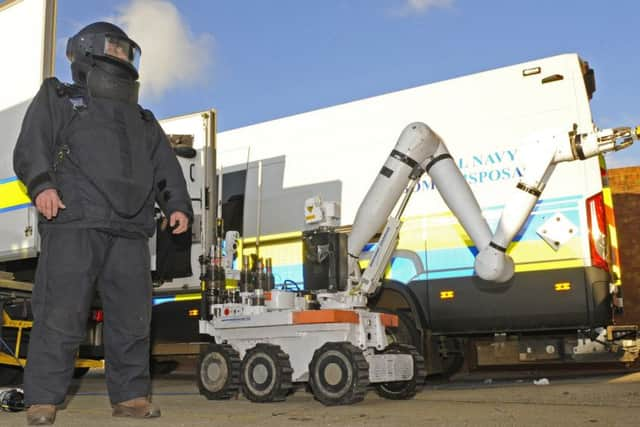

The frogmen of Southern Diving Unit 2 were named ‘Heroes at Home’, collecting their trophy from rugby star Jamie George and Countryfile presenter Anita Rani during a star-studded ceremony, backed by the Ministry of Defence.
The accolade came after a busy year for the team.
As revealed today, SDU2 was called out on 146 occasions between October 2016 and October 2017.
‘This is a fairly average year for us,’ admits Lt Cdr Campbell. ‘They’re not all big, exciting, 1,000kg mines. Some of them are a grenade on a beach or a flare that might degrade and explode.
Advertisement
Hide AdAdvertisement
Hide Ad‘But they’re not things you would want your kids running around with.’
He adds his team is under constant pressure, regularly putting their lives on the line to protect the public.
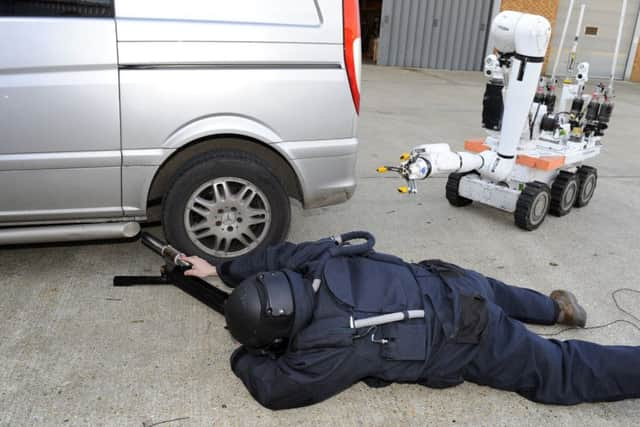

On one occasion, in October last year, the squad was stretched to its limit dealing with two high-profile call-outs in a single day.
‘My first job at Portsmouth was a torpedo in Portland,’ he says. ‘That was an almost unheard-of call-out to a torpedo that had been dredged up by an anchor which amazed everyone – including myself.
Advertisement
Hide AdAdvertisement
Hide Ad‘At the same time I was doing this job my team was responding to a chemical bomb task in Lincolnshire.
‘It was very far from the sea, in a land environment where some suspected criminals disposed some chemical munitions in a lake.
‘There had already been chemical burns casualties and my team bravely responded to that, including diving in the unknown water.
‘Sometimes we spread ourselves thin but I’m lucky enough to command a unit of keen, highly-trained very well motivated divers who want to do their best to help.’
Advertisement
Hide AdAdvertisement
Hide AdBut he adds: ‘This situation was very rare and didn’t leave us with much redundancy.’
The missions can be dangerous, and team members admit they all have a ‘dark, gallows-style’ sense of humour.
But the squad has a vast array of kit to help them tackle any job, as safely as possible.
Among these is the state-of-the-art Cutlass unmanned ground vehicle.
Advertisement
Hide AdAdvertisement
Hide AdThe robot is a key addition to the team, allowing operators to safely approach suspect packages or bombs and neutralise them – without risking the life of a diver.
AB diver Andy Waller is one of the men trained to control Cutlass.
Sitting in a specially-equipped command car, he is able to use a 21in touch screen computer to control every subtle movement of the robot – from distances of more than a mile.
‘The system can work on line-of-sight or can be controlled by a fibre optic link,’ he says, adding the fibre-optic control gives a shorter range of 200m or so.
Advertisement
Hide AdAdvertisement
Hide AdOn his screen, he is able to use six cameras to navigate and see exactly what Cutlass’s robot arm is looking at.
To prove a point, he manoeuvres the vehicle over to me and expertly takes a pen from my hand, without any issue.
‘Using something like Cutlass is invaluable,’ says AB Waller. ‘If we’re dealing with an organised terror group large car bomb and it goes wrong and the car blows up that’s it. You’ve lost one of the team.
‘It’s better to blow up a robotically-controlled vehicle than a person.’
Advertisement
Hide AdAdvertisement
Hide AdThe diver has been based at the Portsmouth unit for almost two years.
He adds the pressure of the job was never something that got to operators on the team – despite potentially having to deal with a life and death situation every time they’re called out.
‘Our business is putting ourselves in harm’s way to protect the lives of others,’ he said. ‘That’s just what we do.
‘As divers, our primary role is underwater bomb disposal. But we also deal with munitions and IEDs on land.’
Advertisement
Hide AdAdvertisement
Hide AdAs well as protecting people from bombs, AB Waller has also received an award for his heroism in rescuing an acclaimed powerboat racer from almost certain death.
He was part of a team of safety volunteers at the F4 World Championships, when a devastating crash almost killed acclaimed British mariner, Colin Jelf.
AB Waller sprang to action, using his diving skills to pull the critically-wounded racer out of his wrecked boat, saving his life.
To mark his courage, he was among a number of people honoured at the Royal Yachting Association awards ceremony this month.
Advertisement
Hide AdAdvertisement
Hide Ad‘His wife said had it not been for the team, her husband could have died,’ he adds.
Lt Cdr Campbell says he is proud of every single member of his team: ‘It never feels like a normal day in the office,’ says Lt Cdr Campbell.
‘As much as you become more and more experienced you never stop appreciating what a unique and useful job this is and how fulfilling it is.’